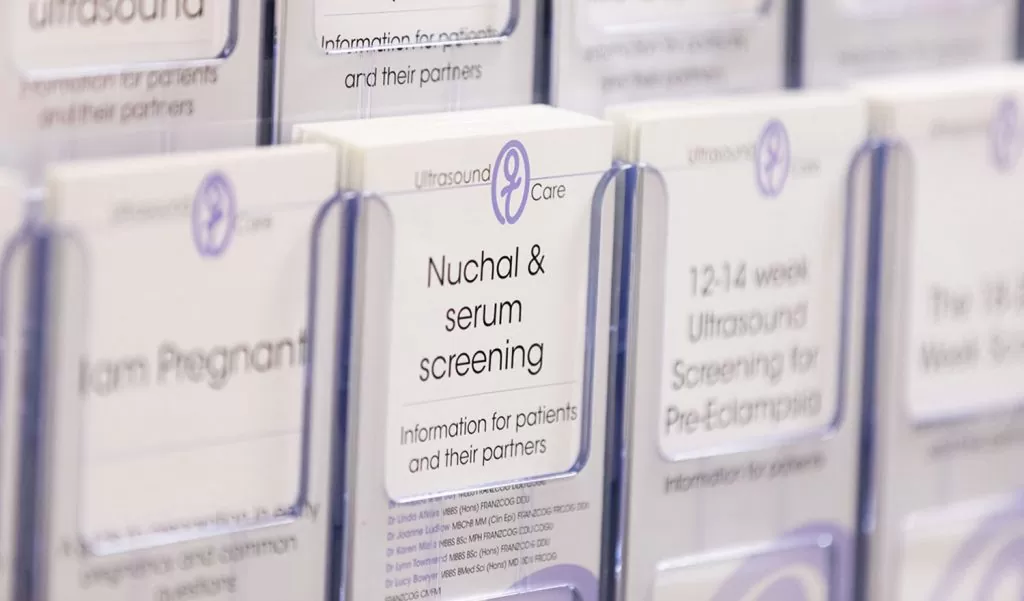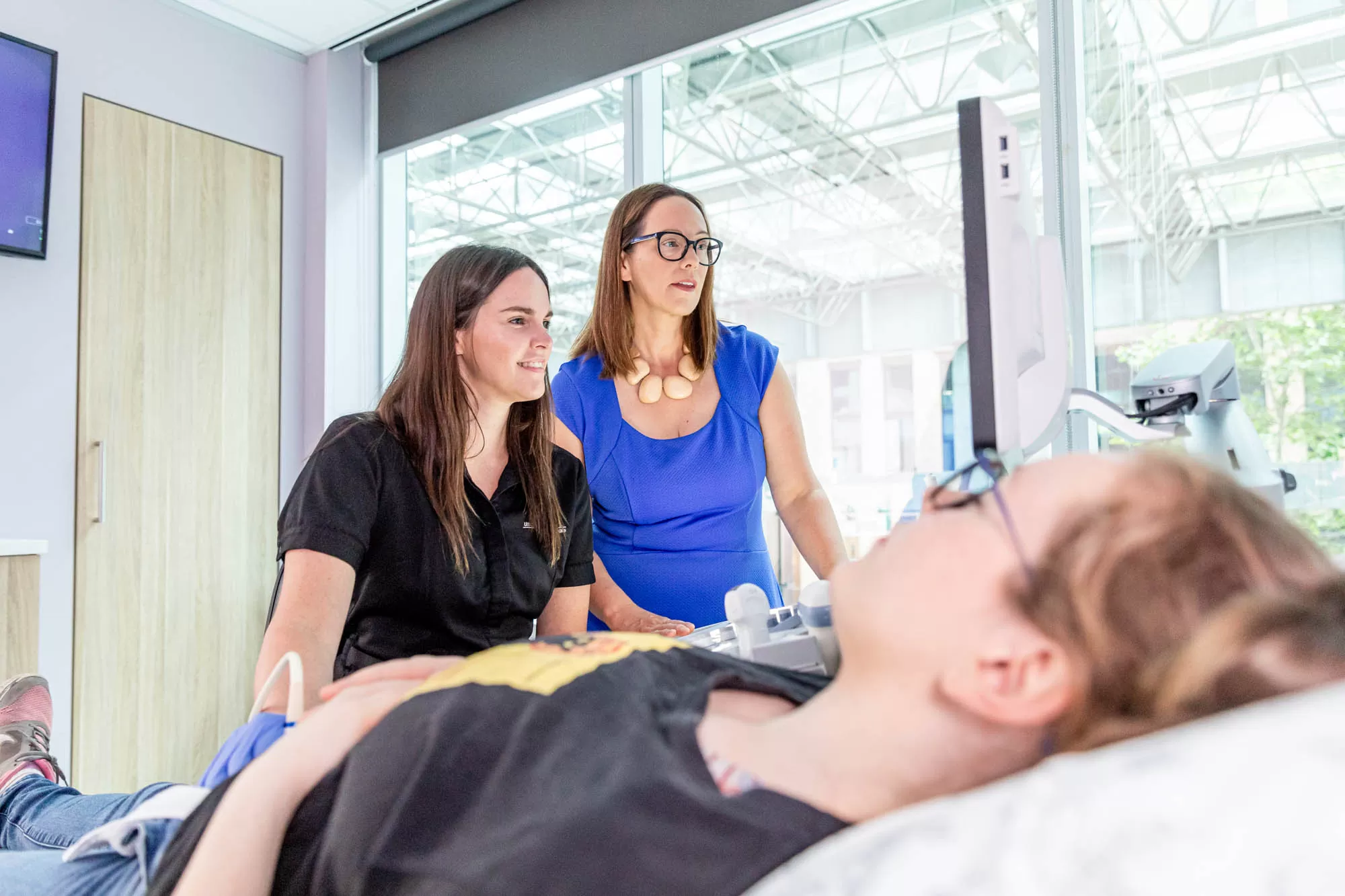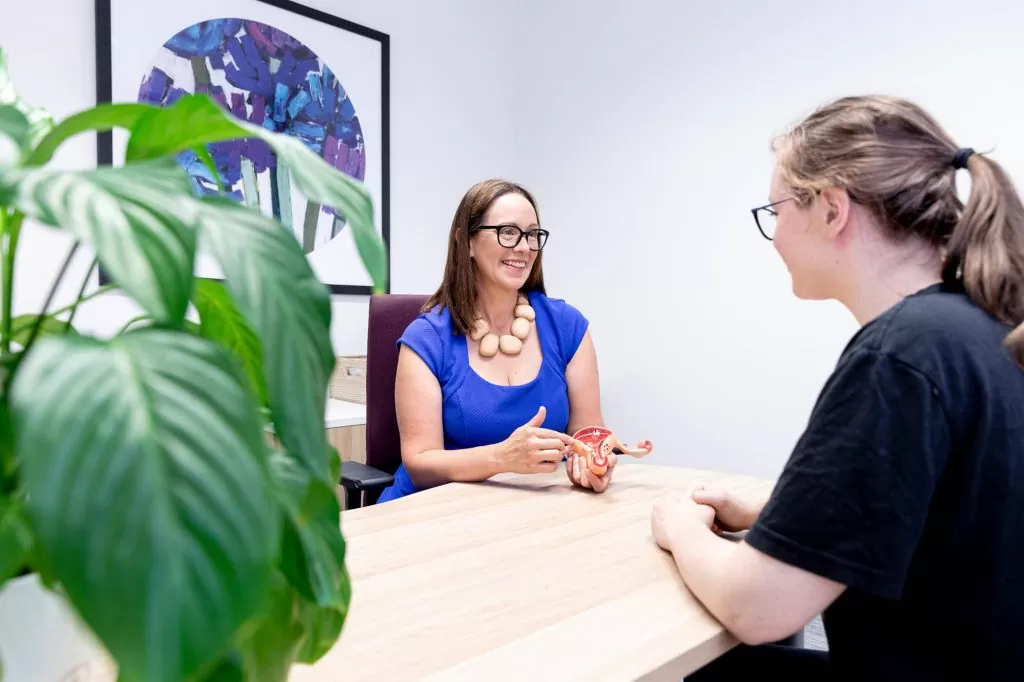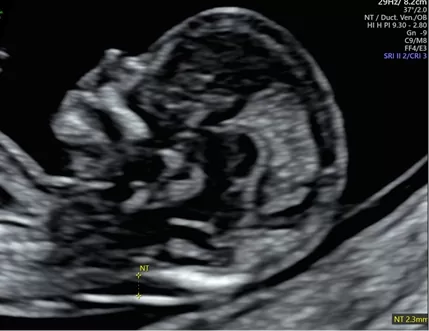Nuchal Translucency Scan
Screening for Down syndrome in early pregnancy
Every person is excited about their pregnancy and hopes that they will have a healthy baby. To help a parent be informed and reduce the chance of having a baby with a disability, Ultrasound Care offers our future parents an optional Nuchal Translucency Screening test during pregnancy which lets you know if your baby is possibly affected with Down syndrome.
What is Down syndrome?
Down syndrome is a condition that results in intellectual disability of varying degrees and may cause physical problems such as heart defects, or difficulties with the sight and hearing. About 1 in 700 babies born in New South Wales will have Down syndrome. Although all women have a risk of having a baby with Down syndrome, this risk increases with the age of the woman.
Down syndrome is a chromosome abnormality. It is caused by having 3 rather than 2 copies of chromosome number 21.

What does a nuchal translucency screening for Down syndrome involve?
The test has two parts:
- Part 1: A blood test from the pregnant mother’s arm.
- Part 2: An Ultrasound.
There is no risk to the baby from either of these procedures. By combining the results of the two parts of the test we can identify if the baby is at increased chance of having Down syndrome with up to 95% accuracy. By itself the test does not tell you whether or not the baby has Down syndrome, but gives you an individualised risk which may help identify whether you would like to test the pregnancy further.
 The blood test, also known as the maternal serum screening test measures the amount of different proteins called beta-HCG, Pregnancy associated plasma protein-A (PAPP-A) and Placental growth factor (PlGF) which occur naturally in the mother’s blood during pregnancy.
The blood test, also known as the maternal serum screening test measures the amount of different proteins called beta-HCG, Pregnancy associated plasma protein-A (PAPP-A) and Placental growth factor (PlGF) which occur naturally in the mother’s blood during pregnancy.
A change in the level of these proteins may indicate that there is an increased chance that the baby has Down syndrome or other common trisomy. The Nuchal Translucency Screening ultrasound can be done by our specially trained sonologist or sonographer between 11.5 and 14 weeks of pregnancy, ideally late in the 12th week. It is usually performed through the abdominal wall but sometimes it is necessary to do an internal (vaginal) scan. The ultrasound has no known harmful effects on the mother or the baby. The ultrasound allows measurement of the amount of fluid in the skin at the back of the baby’s neck. This measurement is called a nuchal translucency.
The Nuchal Translucency Screening ultrasound can be done by our specially trained sonologist or sonographer between 11.5 and 14 weeks of pregnancy, ideally late in the 12th week. It is usually performed through the abdominal wall but sometimes it is necessary to do an internal (vaginal) scan. The ultrasound has no known harmful effects on the mother or the baby. The ultrasound allows measurement of the amount of fluid in the skin at the back of the baby’s neck. This measurement is called a nuchal translucency.
All babies at this stage in pregnancy have some fluid in this area, but those with Down syndrome or another chromosome abnormality tend to have more fluid. The ultrasound also checks for:
The presence of a heart beat
Single or multiple pregnancy
Accurate estimation of the due date
Exclusion of some other abnormalities of the baby
When is the test done?
The nuchal translucency test can be done between 11 and a half weeks and 14 weeks of pregnancy (ideally late in the 12th week). To allow us to ensure you receive the results on the day of your ultrasound, the blood test must be taken at least a few days before the ultrasound is performed, preferably at 10 weeks.
How accurate is the test?
By combining the information about a woman’s age, the results of the blood test and the nuchal translucency measurement, the test can identify about 9 out of 10 pregnancies in which the baby has Down syndrome.
It is very important to realise that this test is for Down syndrome, trisomy 18 and 13 and that a ‘low chance’ result does not exclude Down syndrome or ensure that the baby is free of other possible birth defects.


How long will it take to get the results?
If the blood test result is available, the combined results of the two tests will usually be available soon after the ultrasound examination.
What if the test finds my pregnancy is at an ‘increased chance’ of Down syndrome?
1 in 20 women will have an ‘increased chance’ result. This does not necessarily mean that there is a problem in your pregnancy, but it does mean you should consider further tests to see if there is a problem . Other tests we may recommend involve further screening with cell free fetal DNA testing or diagnostic testing with chorionic villus sampling or an amniocentesis.
What if the test finds my pregnancy is at a ‘low chance’ of Down syndrome?
19 out of 20 women tested will have a ‘low chance’ result. This means that the risk of having a baby with Down syndrome is very low but unfortunately, it does not mean that there is no risk.
Does the test pick up any other birth defects?
Cardiac defects, skeletal defects and other chromosomal abnormalities can also be suspected.
Do I have to have both parts of the test?
No, the decision is your choice entirely, but the combination of the two tests allows a more accurate result.
Do all pregnant women have the screening test for Down syndrome?
No. The decision whether to be tested is entirely up to you. Here are a few questions you may want to consider before you decide whether to have the test:
- In what ways would Down syndrome affect my baby and my family?
- What are the chances of my baby being affected?
- Would I want to know ahead of time if there is a problem with my baby?
- Would I consider termination of pregnancy if the baby were affected?
- That the test does not identify all pregnancies with Down syndrome, does this matter?
- If I tested at “increased chance” would I consider having a chorionic villus sample or amniocentesis even though there is a chance of a miscarriage from this test?
How can I get more information about this test?
You can discuss any of these issues with your doctor, midwife, your obstetrician or your Ultrasound Care specialist doctor or sonographer at your initial consultation . In addition, we also offer an information and counselling service regarding this test, which includes:
- More detailed information about the test itself.
- Assistance to understand the implications of the test.
- Help to interpret the results.
One of our core values at Ultrasound Care is to ensure our patients are provided with the ability to make informed choices. If you’re not sure about how to proceed, please ask our staff today about your options.






 The blood test, also known as the maternal serum screening test measures the amount of different proteins called beta-HCG, Pregnancy associated plasma protein-A (PAPP-A) and Placental growth factor (PlGF) which occur naturally in the mother’s blood during pregnancy.
The blood test, also known as the maternal serum screening test measures the amount of different proteins called beta-HCG, Pregnancy associated plasma protein-A (PAPP-A) and Placental growth factor (PlGF) which occur naturally in the mother’s blood during pregnancy. The Nuchal Translucency Screening ultrasound can be done by our specially trained sonologist or sonographer between 11.5 and 14 weeks of pregnancy, ideally late in the 12th week. It is usually performed through the abdominal wall but sometimes it is necessary to do an internal (vaginal) scan. The ultrasound has no known harmful effects on the mother or the baby. The ultrasound allows measurement of the amount of fluid in the skin at the back of the baby’s neck. This measurement is called a nuchal translucency.
The Nuchal Translucency Screening ultrasound can be done by our specially trained sonologist or sonographer between 11.5 and 14 weeks of pregnancy, ideally late in the 12th week. It is usually performed through the abdominal wall but sometimes it is necessary to do an internal (vaginal) scan. The ultrasound has no known harmful effects on the mother or the baby. The ultrasound allows measurement of the amount of fluid in the skin at the back of the baby’s neck. This measurement is called a nuchal translucency.